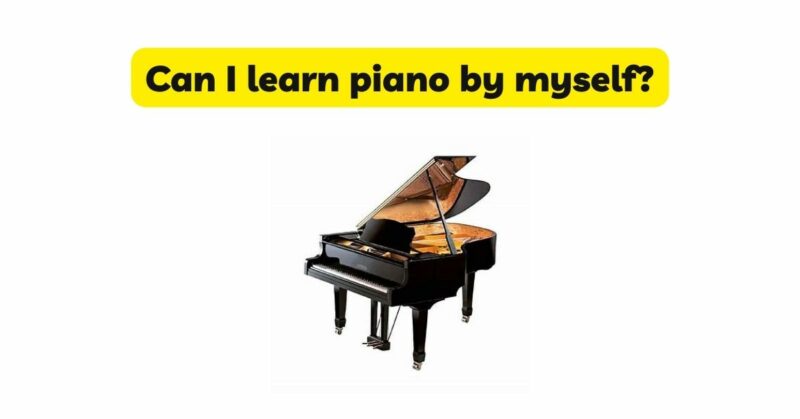Learning to play the piano is a fulfilling and rewarding endeavor that opens the door to a world of musical expression. While many people take formal lessons with a piano teacher, self-learning has gained popularity as a viable option for those who prefer a more flexible and independent approach. This article aims to explore the concept of learning piano by oneself, examining the benefits, challenges, resources, and strategies that can contribute to a successful self-learning journey. By understanding the possibilities and considerations of self-learning, individuals can make an informed decision about embarking on their solo piano adventure.
Benefits of Self-Learning:
- Flexibility and Independence: One of the significant advantages of self-learning is the flexibility it offers. You have the freedom to choose your own schedule, pace, and learning materials. You can tailor your learning experience to fit your specific needs, preferences, and availability. Self-learning allows for a more personalized and adaptable approach to piano education.
- Cost-Effectiveness: Formal piano lessons can be expensive, especially when considering the cost of ongoing sessions with a qualified teacher. Self-learning eliminates the financial burden associated with regular lessons, as resources such as online tutorials, instructional books, and educational apps are often more affordable or even free. This cost-effectiveness makes self-learning an attractive option for individuals on a limited budget.
- Personalized Learning Experience: Self-learning allows you to focus on the aspects of piano playing that interest you the most. You can explore various musical genres, experiment with composition and improvisation, or delve into specific techniques or repertoire that align with your musical preferences. The ability to customize your learning experience contributes to a sense of personal fulfillment and artistic expression.
- Self-Motivation and Empowerment: Self-learning requires self-discipline and motivation. It empowers individuals to take ownership of their learning process and progress. Setting and achieving personal goals, overcoming challenges, and seeing improvement through self-dedication can be highly rewarding and build self-confidence. Self-learners often develop a strong sense of autonomy and self-reliance, which can extend beyond the realm of piano playing.
Challenges and Considerations:
- Structure and Progression: Without a teacher to guide your progress, it can be challenging to establish a structured learning plan and ensure a steady progression. Developing a clear practice routine, setting achievable goals, and monitoring your progress can help overcome this challenge. Utilizing online resources, instructional books, and other self-learning tools can provide guidance in structuring your learning journey.
- Technique and Posture: Proper technique and posture are crucial in piano playing to avoid injury and develop a solid foundation. Without a teacher’s guidance, it can be challenging to identify and correct technical flaws or establish a healthy playing posture. Engaging in self-study resources that focus on technique, watching instructional videos, and utilizing mirrors for self-observation can assist in addressing these challenges.
- Feedback and Evaluation: Receiving feedback and evaluation is essential for growth and improvement as a pianist. Without a teacher, it can be difficult to identify and correct mistakes, refine musical interpretations, or gain insights into performance nuances. Seeking opportunities for peer feedback, participating in online communities or forums, or periodically consulting with a knowledgeable pianist can help fill this gap and provide valuable feedback.
Resources and Strategies for Self-Learning:
- Online Tutorials and Instructional Videos: The internet offers a vast array of resources, including online tutorials and instructional videos by experienced pianists and educators. Websites, YouTube channels, and platforms dedicated to piano education provide step-by-step guidance on various aspects of piano playing, from basic techniques to advanced repertoire. These resources can be valuable companions in your self-learning journey.
- Instructional Books and Sheet Music: Instructional books and sheet music designed for self-learners can be valuable tools in your piano education. Method books, technique guides, and graded repertoire collections offer structured learning material and progression. Additionally, a variety of sheet music publications cater to different skill levels and musical styles, allowing you to explore a wide range of repertoire.
- Educational Apps and Software: Educational apps and software provide interactive learning experiences and practice tools for self-learners. These resources often include features such as virtual keyboards, interactive lessons, practice tracking, and feedback mechanisms. They can supplement your self-learning journey by providing additional guidance and support.
- Online Communities and Forums: Engaging with online communities and forums dedicated to piano playing can provide a sense of community and connection with fellow pianists. These platforms offer opportunities to seek advice, share experiences, receive feedback, and participate in discussions related to piano playing. Being part of a supportive community can enhance motivation and provide valuable insights.
- Attend Workshops and Masterclasses: Although you are primarily self-learning, attending workshops and masterclasses conducted by experienced pianists can offer valuable learning opportunities. These events provide insights into performance techniques, interpretation, and artistic expression. Participating in such events can expose you to different perspectives and inspire your musical growth.
Conclusion:
Learning to play the piano by yourself can be a rewarding and enriching experience. It offers flexibility, cost-effectiveness, and the ability to personalize your learning journey. While self-learning requires self-discipline, motivation, and resourcefulness, the abundance of online tutorials, instructional books, educational apps, and online communities make it more accessible than ever before. By considering the challenges, utilizing the available resources, and employing effective strategies, you can embark on a successful solo piano learning journey. Remember that while self-learning can be fulfilling, seeking occasional guidance from a knowledgeable pianist or participating in workshops can further enhance your progress and ensure a well-rounded musical education.


